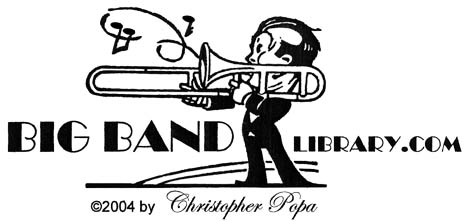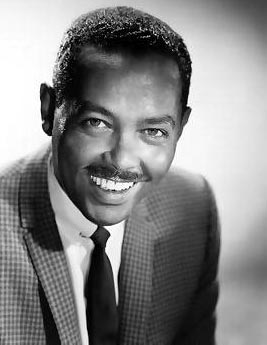
vital stats:
given name William Clarence Eckstein
birth Jul. 8, 1914, Pittsburgh, PA
death Mar. 8, 1993, Pittsburgh, PA, cardiac arrest
grandfather William F. Eckstein, b.1863, Prussia
grandmother Nannie Eckstein, b.1863, Virginia
father William Eckstein, a chauffeur
mother Charlotte Eckstein
sister had two PhDs
sister a certified public accountant (i.e., "CPA")
first wife June Eckstine, m.1942, div.
second wife Carolle Drake, m.1953, div.1977
son Ed, president of Mercury Records
son Guy, director of artists & repertory with Verve Records
son Billy Jr.
son Ronnie
son Kenny
daughter Gina
daughter Charlotte Carolle
education Armstrong High School, Washington, DC; physical educator major, St. Paul Normal
and Industrial School, Lawrenceville, VA; Howard University, Washington, DC
residence [ boyhood ] East Liberty, PA; [ adult ] Las Vegas, NV
In 1939 Eckstine was hired as vocalist with Earl Hines' orchestra, and recorded with them such jukebox hits as Stormy Monday Blues; Jelly, Jelly; Somehow; and You Don't Know What Love Is. He introduced Skylark, a future standard, for the very first time on the radio with them in 1942.
He left Hines in September 1943.
Eckstine formed his own band in June 1944, and. along with featuring his virile voice, it became a stimulating training ground for modern jazzmen.
The members of that band, at various times, read like a who's-who of bebop: for example, trumpeters Dizzy Gillespie, Miles Davis, and Fats Navarro; saxophonists Charlie Parker and Dexter Gordon; and drummer Art Blakey. Eckstine's female vocalist was Sarah Vaughan, and his arrangers included Tadd Dameron and Gil Fuller.
They broke in with a tour down the east coast of Florida, across to Texas, and up to Kansas City, MO. Their itinerary then took them to, among other venues, the Club Riviera in St. Louis, the Regal Theater in Chicago, the Howard Theater in Washington, DC, the Club Plantation in Los Angeles, and the Club Sudan in New York City.
It was reported that the band grossed $100,000 during its first six months.
"The sidemen liked Eckstine, and he, in turn, seemed inspired in his singing by the association with the musicians," jazz critic George Hoefer later observed. "He was secretly practicing valve trombone, after realizing he'd never be able to compete with his trumpeters."
Yet, as fine as the musicians in his band were, it became Eckstine's voice, heard prominently on their 1946 National recordings such as A Cottage for Sale, I'm in the Mood for Love, Prisoner of Love, and You Call It Madness (But I Call It Love), which overtook everything.
He won Esquire magazine's "New Star Award" in 1946, the Down Beat readers' poll from 1948 to 1952, and the Metronome contests as "top male vocalist" from 1949 to 1954.
So in February 1947, Eckstine dropped his band and became a solo performer.
At first nicknamed "The Sepia Sinatra," now he was promoted as "The Great Mr. B."
Additional hits and classic performances followed even more furiously for MGM Records, including Everything I Have Is Yours (accompanied by Sonny Burke and His Orchestra), Blue Moon and Caravan (with Hugo Winterhalter conducting), My Foolish Heart (Russ Case), and I Apologize (with Pete Rugolo's Orchestra) - the latter two reported as million-sellers.
Billy Eckstine in His Own Words:
"I knew exactly what I was, and there was no hang-up with me. None whatsoever. The fact that
the pigment of my skin maybe being lighter brown than other people of my race, maybe some of
them, but you know our race has all colors."
"I'm not much on gimmicks. I never have been because they don't last. But I like a song that tells
a story and has some meat to it, you know, that means something."
"If you want to be a doctor, a lawyer you must go to college. But if you want to be a musician or
such, study your craft. Study music . . . Piano should be the one. Yeah, because that's your
basis. Everything is right there in front of you."
"Well, Bird was a pure genius. There no-you know, you use that term is used very loosely, you
know. Like in my business, I mean, in my travels, I've met three that I would consider-I've met
some very accomplished musicians and talented people---but I think to fall in that genius category,
I don't know but three-that would be Duke Ellington, Art Tatum, and Charlie Parker."
Although other, less-talented performers managed to eventually knock Eckstine off the charts, he continued to sing into the early 1990s, maintaining a successful career with nightclub and concert appearances around the world, including engagements in 1966 with Maynard Ferguson and Duke Ellington.
Also, Eckstine continued to record; he was heard, at various times, on EmArcy, Mercury, Roulette, Motown, Stax, and A&M.
His final LPs included "Momento Brasileiro" (Som Livre 4047124), a 1979 effort; "I Am A Singer" (Kimbo Records KIM 2459), done in 1984; and 1986's "Billy Eckstine Sings with Benny Carter" (EmArcy 832 011), which was nominated for a Grammy.
Eckstine suffered a stroke in 1992 and died the following year.
sources:
All Time Million Selling Recordings, ca.1964.
Stanley Dance, "Billy Eckstine," in The World of Earl Hines (New York City: Charles
Scribner's Sons, 1977), pp.238-245.
Leonard Feather, "Eckstine, Billy," in The Encyclopedia of Jazz (New York City: Horizon
Press, 1955), p.188.
---, "Eckstine, Billy," The Encyclopedia of Jazz in the 60s (New York City: Horizon Press,
Inc., 1966), p.111.
George Hoefer, "The First Big Bop Band," Down Beat, Jul. 29, 1965, pp.23-26.
Anne Janette Johnson, "Billy Eckstine Biography," musicianguide.com.
Richard Severo, "Billy Eckstine, 78, Band Leader And Velvet-Voiced Singer, Dies,"
New York Times, Mar. 9, 1993.
James A. Standifer, interview with Billy Eckstine, Sept. 1985.
Joel Whitburn, Pop Memories 1890-1954: The History of American Popular Music
(Menomonee Falls, WI: Record Research, Inc., 1986), pp.144-145.
I would like to expand this tribute with, if possible, a new interview of someone who was important to Billy Eckstine's life or career. Are you an alumnus of his band, a member of his family, or a collector who is knowledgeable about his accomplishments? Please contact me via e-mail
return to "Biographical Sketches" directory
go to Big Band Library homepage
The big bands are back
in a new and exciting way!
BILLY ECKSTINE
"MR. B. AND HIS BAND"
by Music Librarian CHRISTOPHER POPA
November 2008
He wanted to be a football player but, after breaking his collar bone, and later winning $10 in an amateur singing contest at the Howard Theatre in Washington, DC, he instead chose music.
He changed the spelling of his last name from "Eckstein" to "Eckstine," when a club owner said it looked too Jewish.
In 1944, Eckstine formed his own big band, which jazz fans now consider to have been the first big bop orchestra. With it, he competently played trumpet and valve trombone.
Yet it was his gorgeous bass-baritone voice which most attracted the general public, so he disbanded after only two and a half years and became a solo singer.
